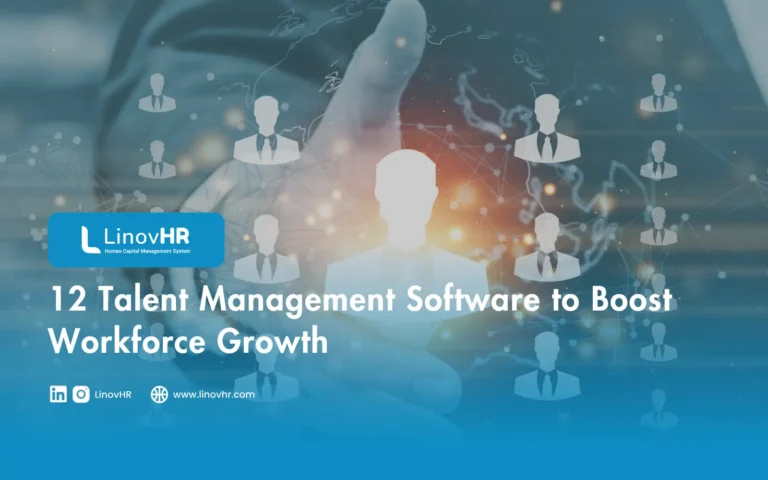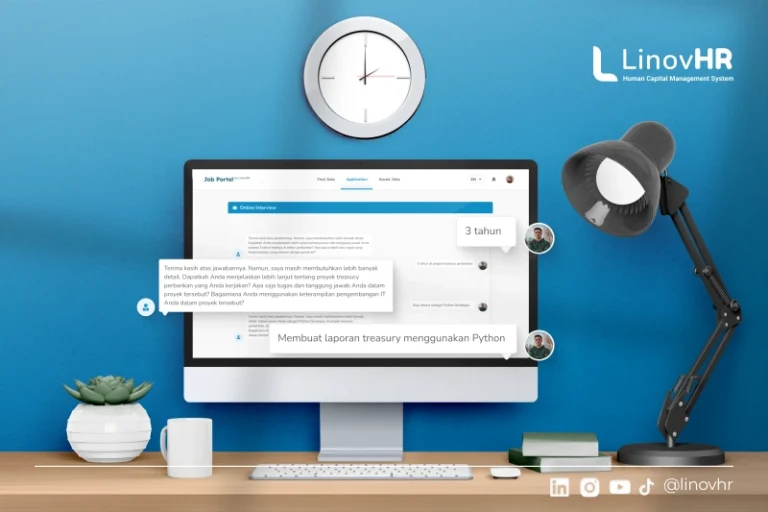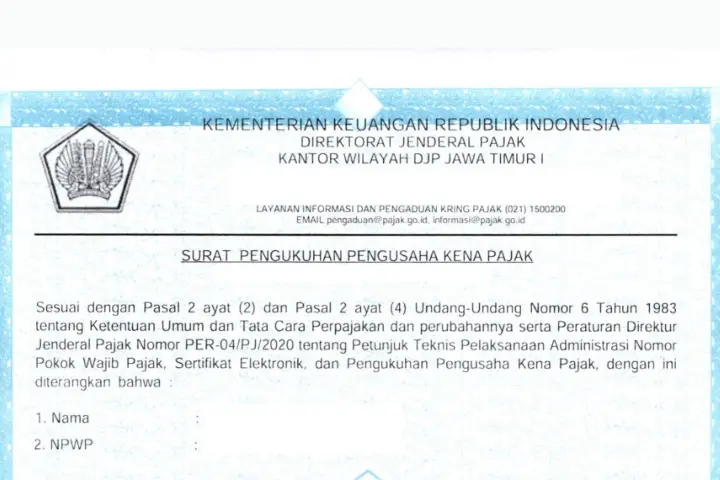In today’s highly competitive job market, companies are realizing that managing their workforce strategically is just as important as hiring the right people.
Talent management software helps HR professionals streamline the entire employee lifecycle from recruitment and onboarding to performance tracking and career development.
This article will guide you through what talent management software is, how to choose the right one, and the top 12 talent management software that can help your business grow.
Understanding Talent Management Software
A talent management software is a comprehensive digital platform that helps companies manage, develop, and optimize to support all aspects of managing human capital.
It enables HR departments to oversee recruitment, onboarding, learning, performance management, and employee retention in a single platform.
This software helps automate administrative processes and ensures data consistency across the employee journey, making HR operations more strategic and data-driven.
Also read: Talent Management System: Definition, Benefits, and Implementation
How to Choose the Best Talent Management Software
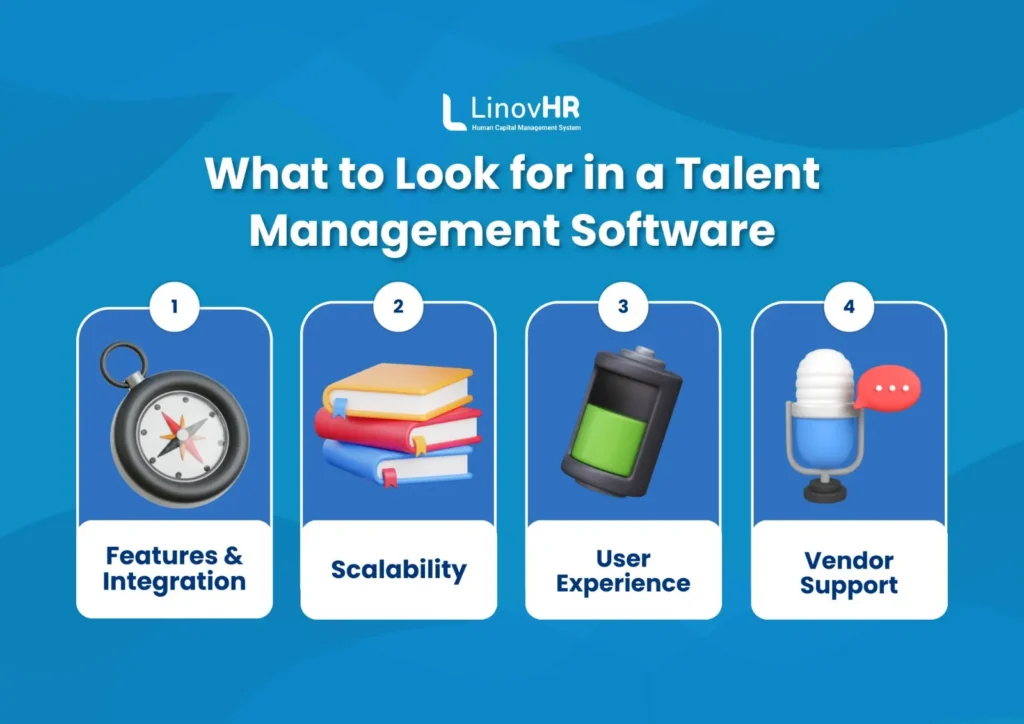
Selecting the right software requires understanding both the technical capabilities of the software and how well it aligns with your company structure and workforce goals. Below are the key factors to consider.
1. Evaluate Core Features and Integration
The right TMS should include modules for recruitment, performance management, learning, and employee engagement.
It’s also crucial that the software integrates seamlessly with other existing HR systems, payroll, or communication tools. A well-integrated platform minimizes data duplication and increases operational efficiency.
2. Consider Scalability
A scalable system allows your HR team to easily add new users, modules, and functionalities without needing to overhaul the entire platform. This ensures that the software remains relevant and efficient as your workforce expands or business processes evolve.
3. Prioritize User Experience
A clean intuitive interface allows HR teams, managers, and employees to easily navigate features like goal setting, feedback tracking, and training programs without extensive technical training.
4. Evaluate Vendor Support
Choose a vendor that provides comprehensive onboarding, accessible customer service, and regular product updates to ensure smooth integration and long-term usability. A trusted support team ensures business continuity and helps HR leaders maximize the system’s full potential.
12 Best Talent Management Software
12 most recommended talent management software that can help your company streamline workforce management, enhance engagement, and improve productivity.
1. LinovHR
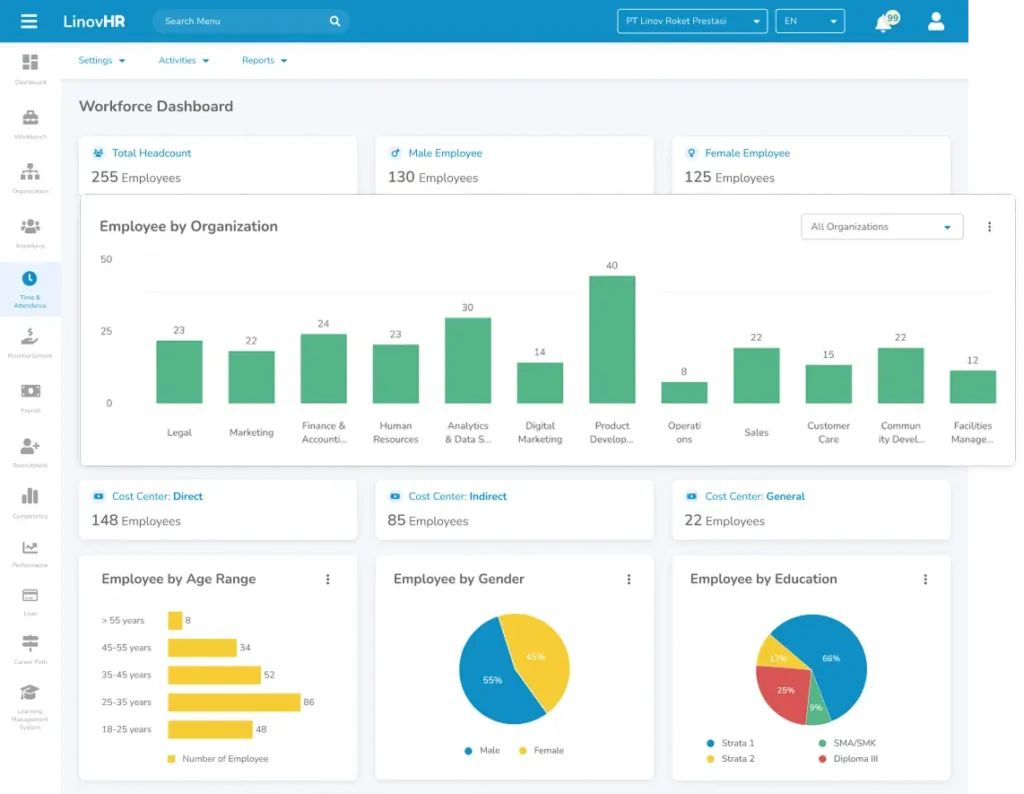
LinovHR’s talent management software stands out as one of Indonesia’s most comprehensive HR software solutions, designed to digitalize every stage of the employee lifecycle.
The platform offers fully integrated modules covering payroll, attendance, performance evaluation, and learning development.
LinovHR’s talent management software helps HR teams eliminate manual errors, gain real-time insights, and strengthen workforce collaboration. It supports end-to-end automation while ensuring data accuracy and HR transparency.
Additionally, LinovHR’s employee self service and performance management modules make it easy for employees to track their goals and for HR to measure performance objectively.
Key features of LinovHR’s talent management software:
- Organization Management: Helps companies digitize and visualize their company structure including divisions, job positions, locations, grades, and job descriptions.
- Personnel Administration: Centralized employee database that stores personal information, employment history, job assignment, and received assets.
- Time Management: Manages attendance, leave, overtime, and shift scheduling. Includes timesheets, visual work hours, and integration with mobile attendance.
- Mobile Attendance: Allows employees to check in and out using their smartphones via face recognition, fingerprint, or PIN.
- Payroll: Automates salary calculation including allowances, overtime, deductions, and tax. Integrated with attendance and employee data.
- Reimbursement: Manages employee reimbursement process such as business expenses, benefits, BPJS, overtime claims quickly and transparently.
- Loan: Facilitates internal employee loan management from application to repayment tracking following company policies and ensuring transparency.
- Employee Self-Service: Empowers employees to access and manage their own HR data such as personal info updates, leave applications, or overtime requests.
- Recruitment: Support the entire hiring process from manpower planning and recruitment requests to job posting and candidate management.
- Competency Management: Defines, evaluates, and manages employee competencies. Helps identify skill gaps, create competency models, and plan employee development.
- Performance Management: Monitors and evaluates employee performance using goals, KPI’s, 360 degree feedback, and balanced scorecard methods.
- Career Path: Provides a structured framework for employee career progression within the company, ensuring transparency and motivation in career development planning.
- Succession Management: Identifies and develops potential successors for key positions. Build a strong internal talent pool and support long-term leadership.
- Learning Management System: Delivers and manages employee training programs via e-learning or in person sessions.
| No. | Pros | Cons |
| 1. | Fully integrated HR modules for end-to-end management | Requires onboarding training for new user |
| 2. | Easy customization and secure infrastructure | Broad functionality may feel complex at the first |
| 3. | Real-time analytics and reporting | |
| 4. | Strong customer support and implementation guidance | |
| 5. | Scalable for small to enterprises businesses | |
| 6. | Cloud and on-premise based | |
| 7. | Free demo request available for the first 6 months. |
2. SAP SuccessFactors
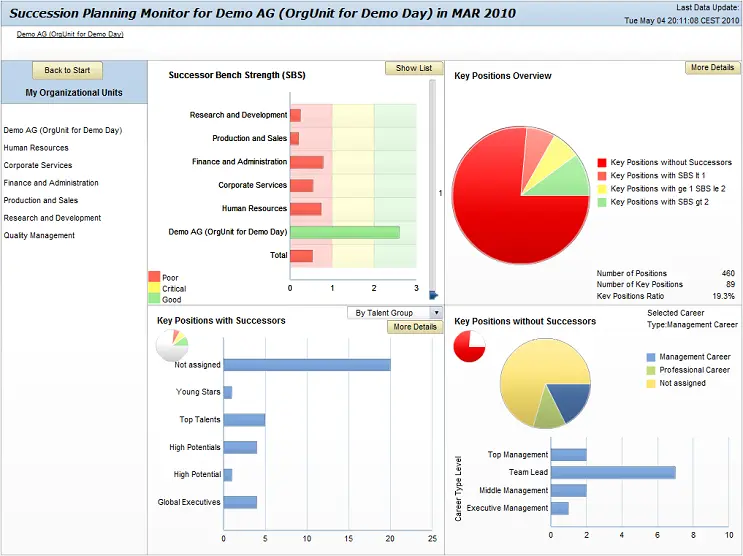
SAP SuccessFactors talent management software is a globally recognized leader in cloud-based talent management. It offers comprehensive features for employee experience, learning, performance, and succession planning.
Its powerful analytics help HR leaders align business goals with workforce strategy through data-driven insights.
SAP SuccessFactors talent management software is ideal for multinational companies seeking an enterprise-level solution that integrates with other SAP systems.
Key features SAP SuccessFactors’s talent management software:
- Recruiting
- Onboarding
- Career and talent development
- Learning
- Performance and goals
- Compensation planning
| No. | Pros | Cons |
| 1. | Comprehensive HR capabilities | Complex implementation |
| 2. | Global compliance tools | Expensive for SMEs |
| 3. | Strong integration with SAP ecosystem | Requires technical expertise |
3. BambooHR
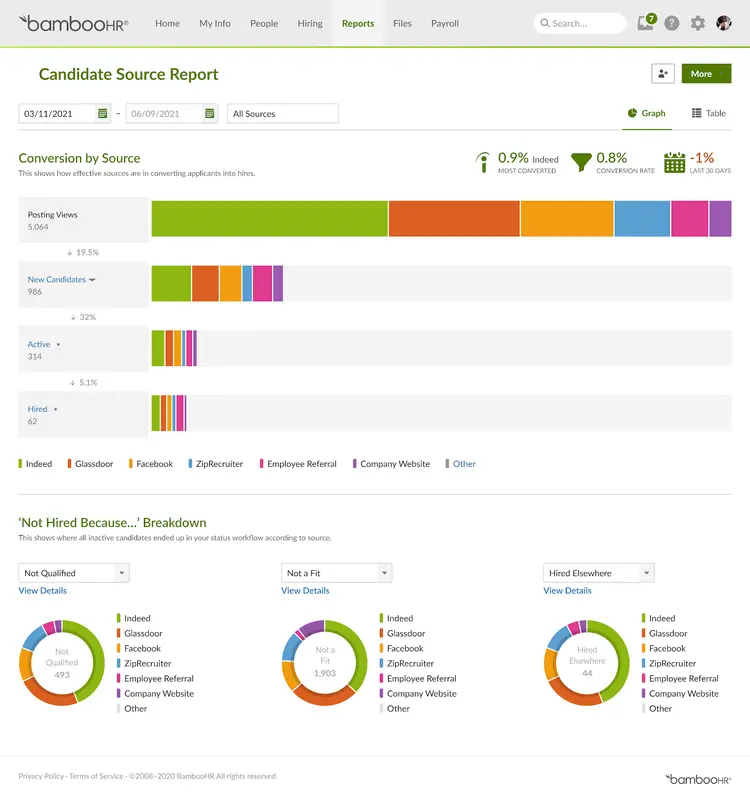
BambooHR is a popular HR software designed for small and medium businesses. It focuses on employee data management, onboarding, and performance tracking in an intuitive and user-friendly interface.
However, it lacks advanced analytics and customization options found in enterprise-grade systems.
Key features BambooHR’s talent management software:
- Onboarding
- Employee experience
- Performance management
- Time & attendance
- Payroll
| No. | Pros | Cons |
| 1. | User-friendly interface | Limited advanced analytics |
| 2. | Excellent customer service | Less suited for large enterprises |
| 3. | Fast and easy setup | Customization options limited |
4. HashMicro
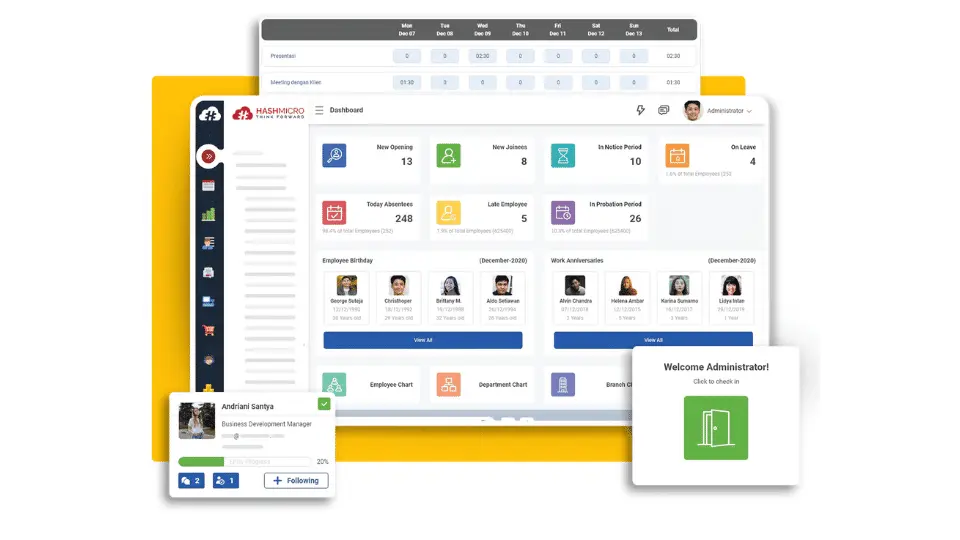
HashMicro’s talent management software provides a robust ERP-based HR system designed for Southeast Asian markets.
It combines HR management with finance, accounting, and project management features making it suitable for medium to large enterprises.
Key features HashMicro’s talent management software:
- Attendance automation
- Contract management
- Multi approval
- Document management digitalization
- Timesheet management
- Automatic payslip
| No. | Pros | Cons |
| 1. | Localized solutions for Southeast Asia | Complex for small businesses |
| 2. | Integrated with finance and ERP modules | Limited global support |
| 3. | Easy customization | Interface can be overw |
5. Talenta by Mekari
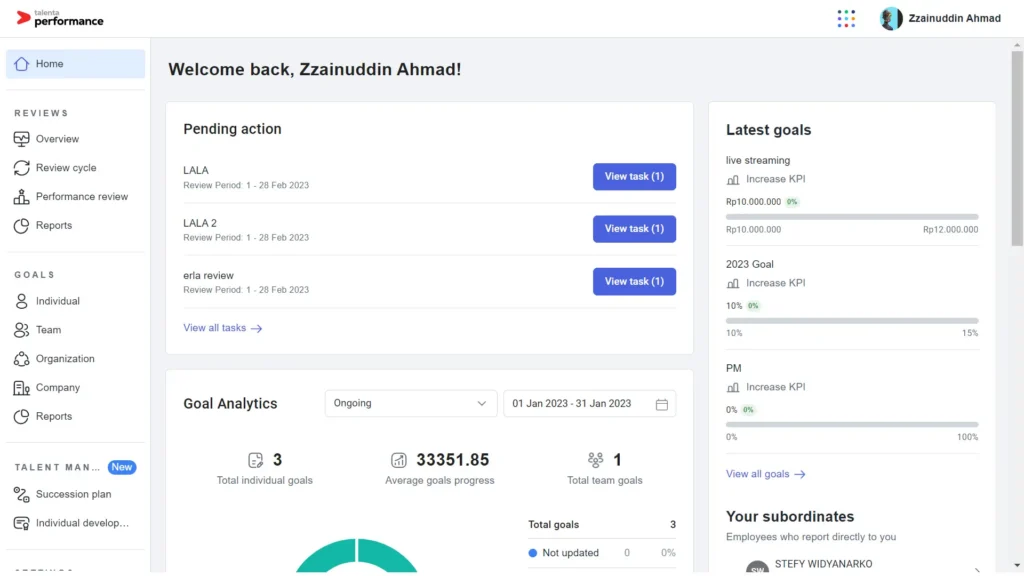
Talenta’s talent management software is designed to help businesses automate payroll, attendance, and performance management. With its mobile-first approach, Talenta ensures HR operations are seamless and accessible from anywhere.
It offers strong local compliance features and integrates well with Indonesian tax systems. Talenta also provides analytics to help HR teams make smarter decisions about workforce planning and productivity.
Key features Talenta’s talent management software:
- Recruitment
- Manpower planning
- Performance management
- Talent development
- Employee benefit
- HR helpdesk
| No. | Pros | Cons |
| 1. | Tailored for Indonesian businesses | Limited learning management tools |
| 2. | Easy-to-use mobile interface | Fewer enterprise grade features |
| 3. | Local tax and compliance support | Reports can be improved |
6. Zoho People
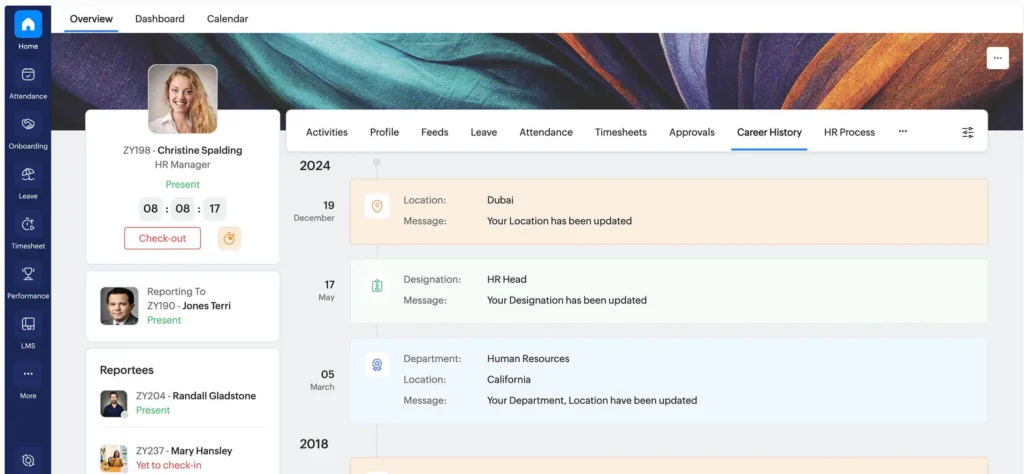
Zoho People is part of the Zoho business suite, offering an affordable and flexible HR solution for small and medium enterprises. It covers essential HR functions like attendance, leave management, performance tracking, and learning management.
One of its main advantages is its integration with other Zoho products, including Zoho Recruit and Zoho Payroll. This makes it a versatile option for organizations already using Zoho’s ecosystem.
Key features Zoho People’s talent management software:
- Attendance and time tracking
- Performance review and goal setting
- Employee database
- Workflow automation
| No. | Pros | Cons |
| 1. | Affordable for SMEs | Limited advanced analytics |
| 2. | Seamless integration with other Zoho apps | Basic customization options |
| 3. | User-friendly interface | May not scale for large corporations |
7. Gadjian
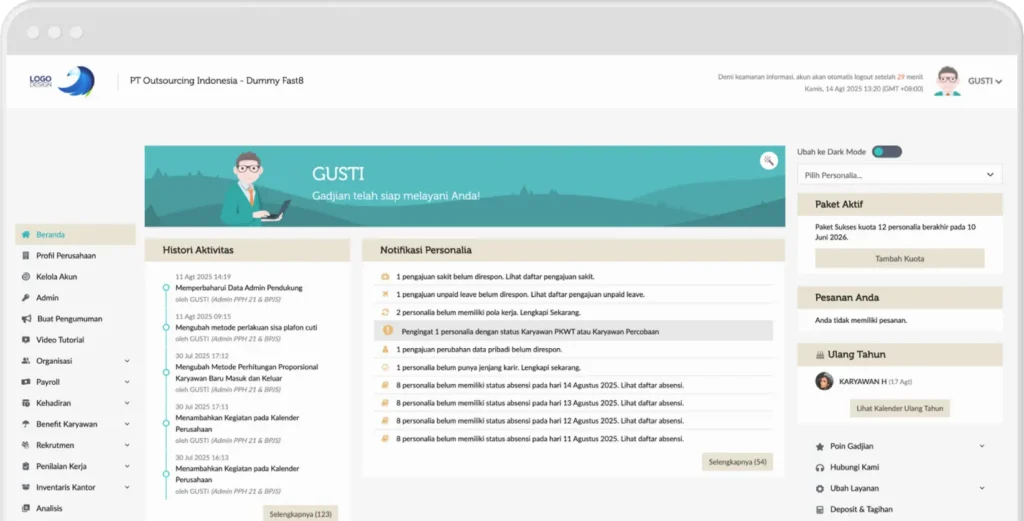
Gadjian is a cloud-based HR and payroll software tailored to Indonesian businesses. It focuses on simplifying HR administration, including payroll processing, attendance, and employee data management.
The software offers an intuitive dashboard for HR teams and provides flexible access for employees through its web and mobile app.
Key features Gadjian’s talent management software:
- Employee Self-Service
- Complete inventory
- QR code generator
- Calculate value assets
| No. | Pros | Cons |
| 1. | Localized for Indonesian labor compliance | Limited learning and performance modules |
| 2. | Affordable for SMEs | Basic reporting capabilities |
| 3. | Simple interface for quick setup | Not suitable for large enterprises |
8. Gusto
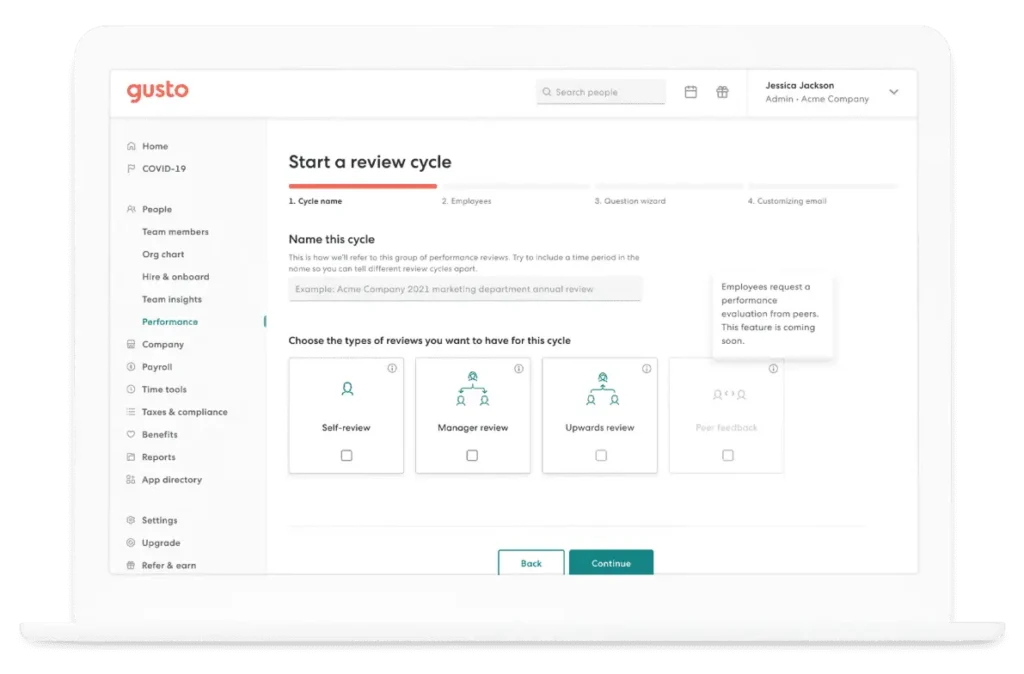
Gusto is primarily known as a payroll and benefits management system, but it also includes features for onboarding and performance tracking.
It’s ideal for startups and small businesses looking for an all-in-one HR and payroll platform. Its main strength lies in automating payroll tax filings and benefits administration.
Key features Gusto’s talent management software:
- Performance reviews
- Performance management
- Learning and development
- Payroll and compliance
| No. | Pros | Cons |
| 1. | Excellent payroll automation | Limited talent management tools |
| 2. | Easy navigation and clean interface | U.S. centric features |
| 3. | Great for small businesses | Not ideal for large enterprises |
9. HiBob
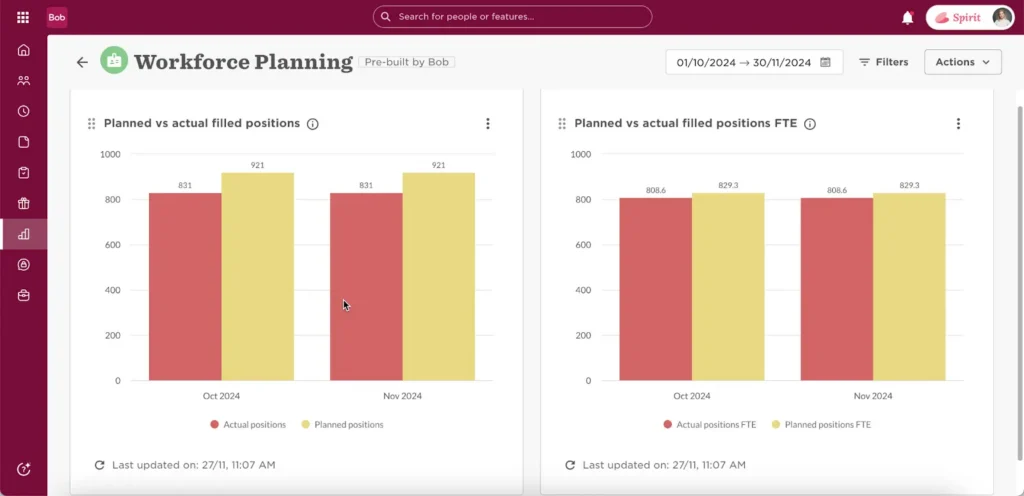
HiBob is a modern HR platform built for fast-growing companies that value people-centric management. It focuses heavily on employee engagement, performance reviews, and organizational transparency.
HiBob’s talent management software helps HR teams simplify workflows while keeping culture and collaboration at the center of the employee experience.
Key features HiBob’s talent management software:
- Onboarding
- Time and attendance
- Payroll
- Hiring
- Learning
| No. | Pros | Cons |
| 1. | Modern and user-friendly interface | Higher pricing for small teams |
| 2. | Strong focus on employee engagement | May requires setup assistance |
| 3. | Advanced analytics for data-driven HR | Limited offline access |
10. Deel
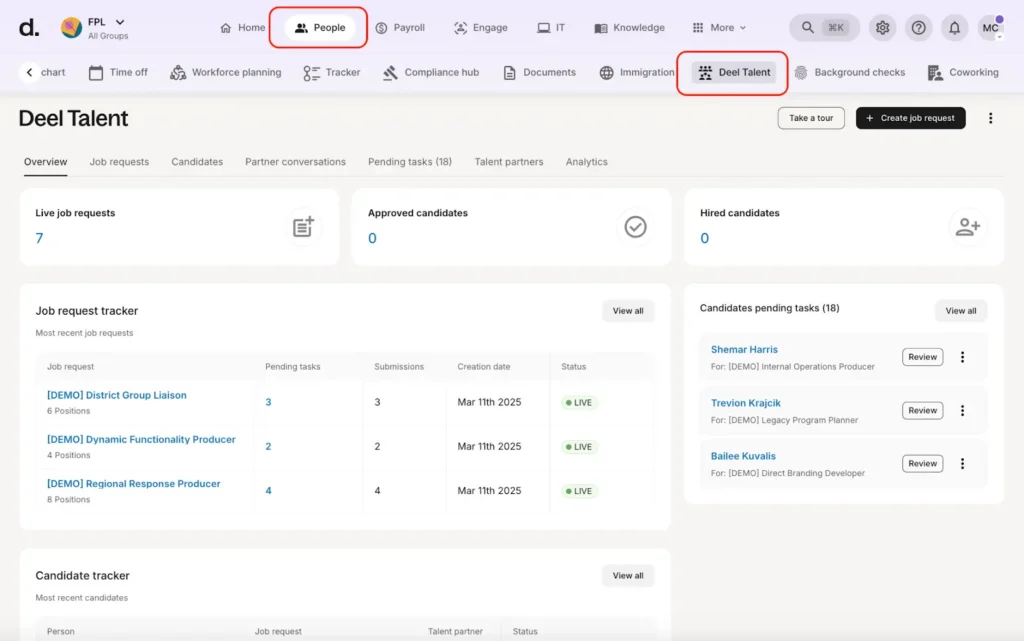
Deel’s talent management software simplifies global workforce management by enabling companies to hire, onboard, and pay employees or contractors in over 150 countries.
It’s particularly useful for remote-first organizations that need to stay compliant with international labor laws.
Key features Deel’s talent management software:
- Job request
- Talent partner
- Work orders
- Onboarding
| No. | Pros | Cons |
| 1. | Ideal for global and remote teams | Limited talent development tools |
| 2. | Strong compliance automation | Costly for small startups |
| 3. | Supports 150+ countries | Requires integration for performance tracking |
11. Workday
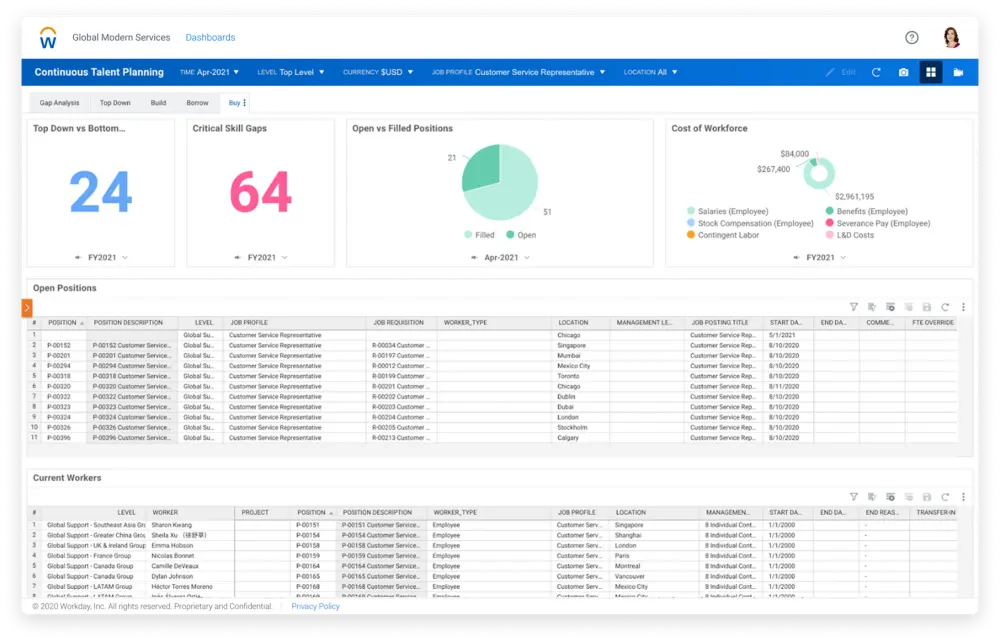
Workday is an enterprise-grade talent management and HR automation system trusted by large organizations worldwide.
It offers comprehensive tools for human capital management, payroll, and workforce planning, making it one of the most powerful HR platforms available.
Key features Workday’s talent management software:
- Learning
- Skills journeys
- Employee experience
- Talent development
- Talent acquisition
- Onboarding
| No. | Pros | Cons |
| 1. | Highly scalable and enterprise ready | High implementation cost |
| 2. | Deep analytics and AI integration | Complex configuration |
| 3. | Excellent compliance and data security | May overwhelm small businesses |
12. Rippling
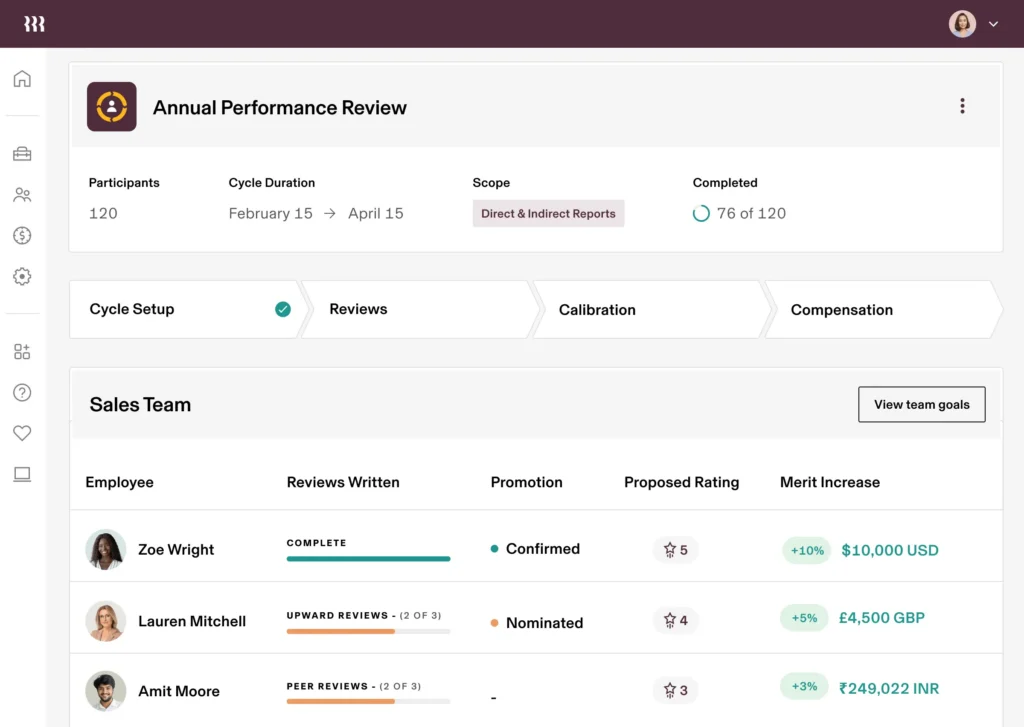
Rippling combines HR, IT, and finance in one unified platform. It allows companies to automate employee management, from hiring and onboarding to payroll, device management, and compliance.
Rippling’s standout advantage is its ability to manage both HR and IT operations, such as automatically provisioning software access for new hires. It’s especially popular among fast-growing tech companies looking to centralize administrative tasks.
Key features Rippling’s talent management software:
- Headcount planning
- Recruiting
- Performance management
- Surveys
- Learning management
| No. | Pros | Cons |
| 1. | Combines HR, IT, and finance in one platform | High subscription cost |
| 2. | Excellent automation and integrations | Learning curve for full adoption |
| 3. | Scalable and secure infrastructure | Advanced features may be overkill for small teams |
Empower Your HR Strategy with LinovHR
Succession of a company depends on how well it manages, develops, and retains its talent. Many companies still struggle with manual HR operations, fragmented data, and inefficient collaboration, which can hold back workforce growth.
LinovHR’s HRIS provides a complete digital HR ecosystem designed to address these challenges. Its fully integrated system automates everything from recruitment and attendance to performance management and learning, helping businesses make smarter, data-backed decisions.
Request a free demo now and experience how LinovHR’s HRIS software can simplify every talent management software process, improve efficiency, and elevate your company’s human resource management to the next level.

